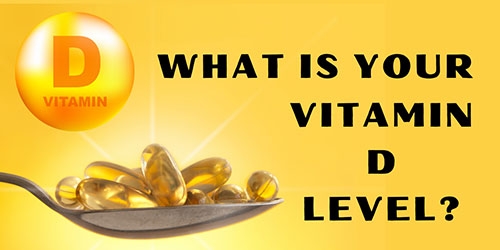You are here
Home ›Importance of Vitamin D

Vitamin D is a fat soluble vitamin that helps a body absorb calcium, which is needed for building strong bones. It also helps muscles move, nerves carry messages from the brain to the body, and strengthens the immune system.
The best food sources of Vitamin D come from milk or other fortified “milk” drinks, such as soy, almond, oat, along with fatty fish, such as trout, salmon, tuna, mackerel. Beef liver, egg yolks, cheese and mushrooms also provide a little. A body can also make Vitamin D from the sun when bare skin is exposed, but factors such as clouds, smog, sunscreen, old age, and having dark-colored skin can reduce the amount it makes.
Those who don’t eat foods rich in Vitamin D, don’t get enough sunlight (especially in the winter months), are older, have dark colored skin, are obese or had gastric bypass surgery, or have a condition that limits fat absorption, such as Crohn’s disease, celiac disease, or ulcerative colitis, are at risk for low Vitamin D levels, and should probably get their Vitamin D level checked. (*This information was gathered from the National Institutes of Health-Office of Dietary Supplements.)
Vitamin D tests are not covered as part of the wellness testing package that is often run at the time of an annual physical. It is also not commonly covered by insurance unless a Vitamin D deficiency is diagnosed. Vitamin D is a special test that can be purchased from the Veterans Memorial Hospital wellness testing menu. A person does not need to fast for this test. Call the Veterans Memorial Hospital Laboratory at 563-568-3411 to schedule a time for a blood draw. Results are mailed within five business days.
“People most commonly affected are those with inadequate exposure to sunlight,” explains Raquel Ristau, Nurse Practitioner, Gundersen Clinic and VMH Provider. “Regions far from the equator with high seasonal variation and intensity in sunlight pose a risk. Our region falls into that risk category. Taking vitamin D daily; 2000-4000 units is a reasonable dose that can be initiated without any specific testing. If you have continued symptoms or concerns otherwise, talk with your local health care provider.”
Levels below 30 nmol/L (12 ng/mL) are too low and would warrant the use of a Vitamin D supplement. The hospital also has a supply of these to purchase. If interested, inquire at the main entrance of the hospital. Remember to always talk to a medical provider before taking any supplements as they may interact with other medications.
For more information or to schedule a Vitamin D test, call the Veterans Memorial Hospital Laboratory at 563-568-3411.

